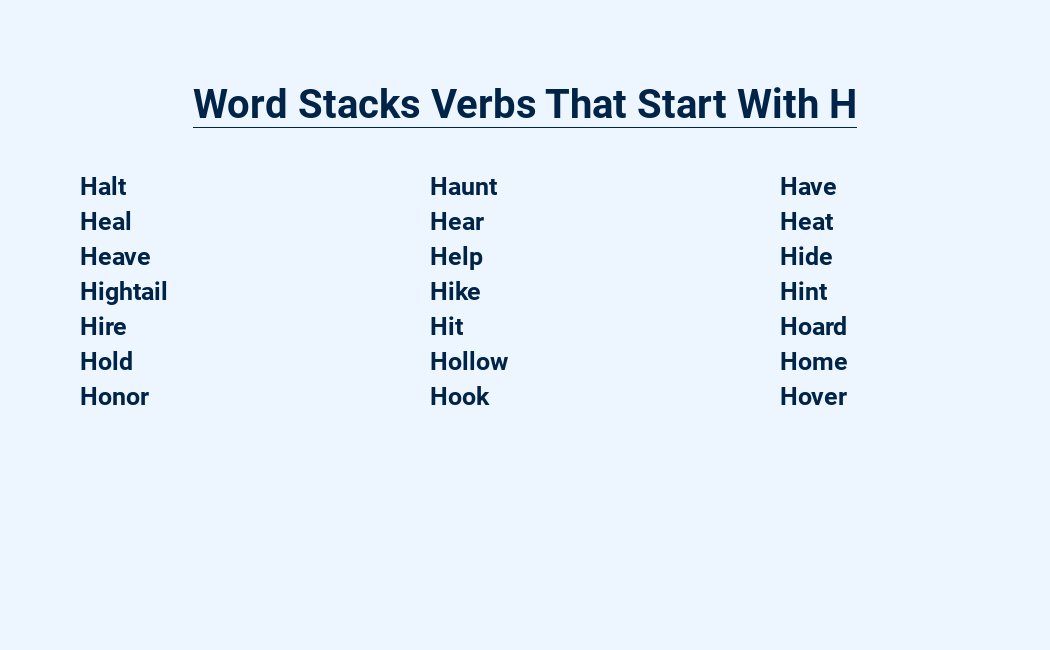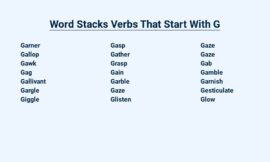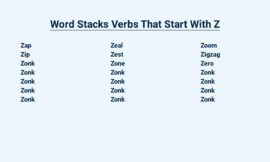Explore a comprehensive guide to the abundant H-verbs in the English language, encompassing the diverse meanings of “Hang,” “Harass,” “Hasten,” “Hatch,” and “Hate.” Delve into the nuances of each verb, uncovering their applications in various contexts. Whether you’re a student, writer, or language enthusiast, this resource provides valuable insights for effective communication and writing.
| Verb | Definition | Example |
|---|---|---|
| Hack | To cut, chop, or sever something with a sharp instrument. | “He hacked at the branches with an axe.” |
| Haggle | To argue or bargain over the price of something. | “The customers haggled with the store owner over the price of the dress.” |
| Hang | To suspend or fasten something from a higher place. | “She hung the painting on the wall.” |
| Harass | To bother or annoy someone continuously. | “The bullies harassed the new student every day.” |
Hang
Hang (v.): To suspend something from a higher object or place
Hang: Suspend something from above. Decorate a wall with paintings.
Display clothes on a rack.
Attach a hammock between trees. Keep keys accessible on a hook.
Hang (v.): To hang clothes or other items to dry
Hang: Suspend clothes or objects from a line, hook, or other support to dry or air out. Typically used for laundry, towels, or delicate items that require gentle drying.
Hang (v.): To execute someone by hanging
Hang, a grim act of capital punishment, involves suspending a person by the neck until death. This method, once prevalent, is now outlawed in many countries due to its inhumane nature.
Hang (v.): To be suspended or supported from something
Hang: To be suspended or supported from something, like a picture hanging on a wall or a bird hanging from a branch.
This verb often implies a state of being rather than an action.
Hang (v.): To remain in a place for a long time
Hang, a versatile verb, captures the essence of enduring presence. Whether it’s a painting adorning a wall or a melody lingering in the air, to hang signifies a prolonged existence in a particular place or state.
Hang (v.): To wait for something
Hang, meaning “to wait for something,” implies a state of anticipation or suspension. Whether it’s waiting for a friend, a bus, or a test result, hanging signifies a period of time spent in expectation.
Hang (v.): To cause someone to wait
Hang, meaning “to cause someone to wait,” often implies a sense of anticipation or delay. It can be used in various contexts, such as waiting for a friend to arrive, waiting for a bus or train, or waiting for a task to be completed.
Hang (v.): To be attached to something
Hang (v.): To be attached to something, either physically or figuratively.
- Attach an ornament to a Christmas tree.
- One’s hopes hang on a thread.
Hang (v.): To droop or sag
Hang (v.): To droop or sag, conveying a sense of limpness and downward movement. Often associated with fabrics, foliage, or body parts lacking support.
Hang (v.): To move or swing freely
Hang, a verb denoting free movement or swinging, evokes images of suspended objects gracefully swaying in the air.
Its usage encompasses both literal and figurative contexts, capturing the essence of motion and fluidity.
Harass
Harass (v.): To annoy or bother someone by repeated attacks or pressure
Harass: To subject someone to unwanted or aggressive behavior repeatedly, causing distress or anxiety. This includes verbal abuse, physical intimidation, or unwanted sexual advances.
Harassment can have severe consequences, affecting a person’s mental and emotional well-being.
Harass (v.): To pester or torment someone
Harass: To subject someone to unwanted and aggressive pressure or intimidation.
This malicious behavior can manifest in various forms, ranging from verbal abuse and threats to unwanted physical contact.
Harass (v.): To persecute or oppress someone
Harass, a verb, carries a connotation of unrelenting torment. It describes persistent persecution or oppression, causing distress and suffering to the targeted individual.
This malicious behavior can manifest in various forms, from verbal abuse and intimidation to physical violence.
Harass (v.): To intimidate or threaten someone
Harass is a verb that means to intimidate or threaten someone, often repeatedly or over a period of time.
It can involve physical, verbal, or psychological abuse, and can have a devastating impact on the victim.
Harass can occur in various settings, such as the workplace, school, or online.
Harass (v.): To make unwanted advances toward someone
Harass: To make unwanted advances toward someone, often in a sexual or aggressive manner. This behavior can be verbal, physical, or psychological and can have lasting effects on the victim.
Harass (v.): To subject someone to sexual harassment
Harass: To subject someone to unwanted sexual advances, remarks, or physical contact, creating an intimidating or hostile environment.
This behavior can profoundly impact the victim’s well-being and workplace productivity.
Hasten
Hasten (v.): To move quickly or hurry
Hasten, a verb meaning “to move quickly or hurry,” implies a sense of urgency and swiftness. It often describes actions taken to expedite a process or reach a destination promptly.
Hasten can also be used metaphorically to convey a rapid progression of time or the acceleration of a situation’s development.
Hasten (v.): To make something happen more quickly
Hasten, a verb that urges for swift action, propels events forward, accelerating their progress. It is the catalyst that sparks change, driving individuals and situations to their desired outcomes with an unwavering sense of urgency.
Hasten (v.): To accelerate or speed up
Hasten, a verb meaning “to accelerate or speed up,” implies a sense of urgency or eagerness. It often suggests a desire to reach a goal or complete a task swiftly.
Synonyms include expedite, hurry, and quicken.
Hasten (v.): To urge someone to do something quickly
Hasten means to press someone to act promptly. It’s often used in situations where time is of the essence and immediate action is required.
Hasten (v.): To hurry to do something
Hasten, meaning to hurry or act quickly, is a crucial verb that underscores the importance of promptness and efficiency. It emphasizes the necessity of swift action to seize opportunities, meet deadlines, or address urgent matters.
Understanding the nuances of hasten empowers individuals to prioritize tasks and optimize their time management skills effectively.
Hasten (v.): To cause something to occur sooner than expected
Hasten, a verb meaning “to cause something to happen sooner than expected,” implies a sense of urgency and acceleration. It often involves taking proactive steps to expedite a process, event, or action, resulting in an earlier completion or occurrence.
Hatch
Hatch (v.): To break open an egg to release the young animal inside
Hatch (verb): To liberate a young animal from its egg by breaking the shell. This verb is commonly associated with birds, reptiles, and insects.
The process of hatching is a crucial stage in the life cycle of these organisms, marking their transition from embryonic development to independent existence.
Hatch (v.): To come out of an egg
Hatch: To emerge from an egg, like a chick or a butterfly, often signifying new beginnings and transformations.
Hatch (v.): To bring a plan or idea to fruition
Hatch (v.): To bring a plan or idea to fruition.
Turn a concept into reality.
Transform a dream into something tangible.
Bring forth something new and meaningful.
Embark on a journey of creation and manifestation.
Hatch (v.): To conspire or plot
Hatch (v.): To conspire or plot Conjuring clandestine schemes, plotting intricate webs of deceit, hatching nefarious plans under the cloak of secrecy.
Hatch (v.): To cause something to come into existence
Hatch (v.): To bring something into existence, like a plan or idea.
It’s the act of initiating or developing something new.
Hatch (v.): To crossbreed different types of animals or plants
Hatch (v.): To crossbreed different types of animals or plants. This process, also known as hybridization, combines genetic material from distinct species to create new varieties with enhanced traits or characteristics.
Hatching is widely used in agriculture to develop improved crops and livestock.
Hate
Hate (v.): To feel intense dislike or aversion for someone or something
Hate, a potent emotion, grips the heart with intense dislike and aversion. It’s a destructive force that can poison relationships, erode empathy, and cloud judgment.
Hate (v.): To despise or loathe someone or something
Hate, a potent emotion, signifies intense dislike and animosity toward a person, object, or concept.
It can manifest as hostility, aversion, or even loathing, often accompanied by a desire to harm or distance oneself from the target of hatred.
Hate (v.): To have a strong aversion to something
Hate, a potent emotion, signifies a deep-seated aversion or hostility towards a person, thing, or idea.
This intense dislike can manifest in various forms, from mild annoyance to overwhelming animosity, often accompanied by a desire to avoid or harm the object of hatred.
Hate (v.): To be filled with hatred or animosity
Hate: To be consumed by intense dislike or animosity, often accompanied by a desire to harm or cause pain to the object of hatred. This powerful emotion can poison the heart and lead to destructive actions.
Hate (v.): To wish harm or misfortune on someone or something
Hate, a venomous emotion, seeps into the heart, poisoning thoughts and twisting intentions. It yearns for harm, misfortune, and suffering to befall its target, leaving a trail of destruction in its wake.
Hate (v.): To make someone feel hatred or animosity
Hate, a powerful emotion, incites animosity and ill will.
It can be bred by fear, prejudice, or personal grievance.
Hate can manifest as verbal abuse, discrimination, or even violence.
Recognizing and addressing its root causes is crucial for fostering tolerance and understanding.
Hate (v.): To cause someone to feel strong dislike or aversion for someone or something
Hate, a powerful emotion, ignites intense feelings of animosity and aversion towards a person, group, or concept. It can manifest as hostility, prejudice, and a desire to harm or exclude the object of hatred.
This destructive emotion often leads to conflict, discrimination, and violence.
Final Verdict
The realm of verbs starting with ‘H’ encompasses a diverse range of actions, from the physical act of hanging to the emotional intensity of hating. These verbs, including hang, harass, hasten, hatch, and hate, find applications in various contexts, enriching our vocabulary and enabling us to express ourselves more precisely and vividly.
Their significance extends beyond mere word choice, capturing the nuances of human experiences, interactions, and emotions.




